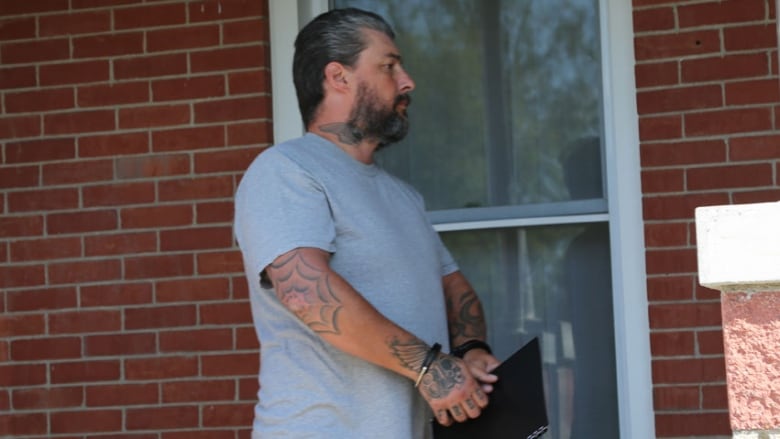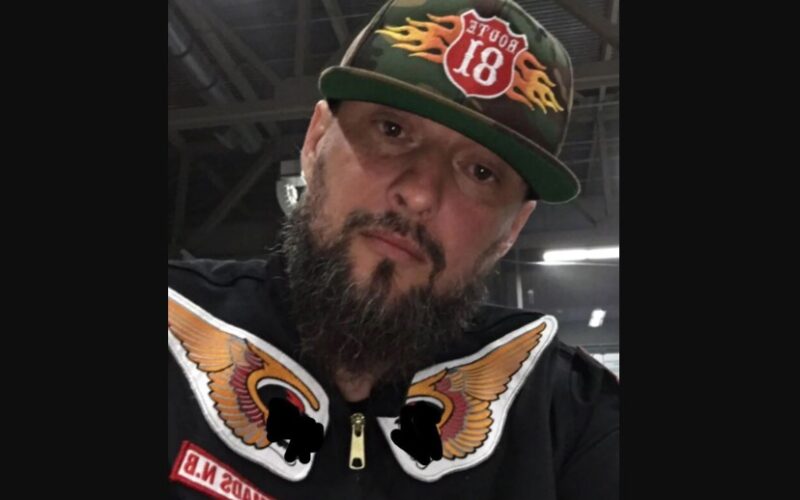The Parole Board of Canada has cancelled day parole for a man police have described as a full-patch member of the Hells Angels, after he rejected the release location proposed by Correctional Service Canada (CSC).
Robin Moulton, 51, is serving a sentence of two years, nine months and 15 days, after time served, for possession of cocaine for the purpose of trafficking and possession of a drug press with the intention of producing or trafficking a substance.

“In this instance you are adamant that you do not want to be released as was proposed,” the decision, dated May 5, says.
“Further, due to an abundance of security information that speaks to the risk your presence poses in any number of release destinations, CSC is only able to arrange your release to a city with a community correctional centre that you have no intention of going to.”
Full parole denied
Last fall, Moulton was granted day parole for six months, despite opposition from CSC and local police. He originally requested full parole, but the parole board denied that request.
The decision doesn’t specify the community where CSC wanted to place Moulton, nor does it say the area where Moulton wanted to be released.
It also doesn’t say the name of the prison where Moulton is serving his sentence.

“You write that you want to be released to community [redacted] where there would be far greater cultural connections and ability to adhere to Maliseet traditions and ceremonies,” the decision says.
“The challenge in implementing that specific plan is that the local community based residential facility [CBRF] is unwilling to provide accommodations.”
The parole board records say Moulton is an Indigenous offender, but he didn’t grow up on a reserve or practise his culture growing up.
“Your lack of community connectivity may have led you to value the [camaraderie], power, and influence associated with your OMG [Outlawed Motorcycle Group] affiliation, while such is also an indication of thrill-seeking behaviour on your part,” the parole board decision says.
Police had storage lockers under surveillance
Moulton was arrested in August 2017 after a lengthy RCMP investigation “targeting the movement of drugs into New Brunswick that involved you and several accomplices,” the parole board records say.
“They were of the belief that you as well as the drugs had clear links to an Outlawed Motorcycle Group [OMG],” the records say.
At his sentencing hearing, the court heard how police had Moulton under surveillance for months as he accessed storage lockers in Fredericton and Woodstock.
After covertly installing a motion-activated camera inside a locker in Woodstock, police saw Moulton using a hydraulic press to compress a white powdered substance into bricks, placing the substance into clear bags and then into a duffel bag before leaving the locker.
When police pulled Moulton over near Woodstock at the time of his arrest, they found cocaine with about 35 per cent purity, which carried a value of between $12,000 and $24,000, the court heard.
Police also found “a loaded handgun and rifle equipped with a silencer” in the storage lockers, parole board records say, but several weapons charges against Moulton were dropped after he pleaded guilty to the drug charges.
Moulton said crimes weren’t linked to Hells Angels
Moulton, who is originally from New Brunswick, is serving his second federal prison sentence.
The parole board records say Moulton was a founding member of his club in a different province and returned home as a step toward establishing a club chapter here.
The Hells Angels have had a Nomads chapter in New Brunswick since 2016, as part of an eastern expansion for Canada’s largest and most powerful motorcycle club. It also established a chapter in Prince Edward Island in 2019.
Moulton told the parole board that he saw the Hells Angels as more of a “social club” and noted that membership wasn’t illegal.
He also emphasized that there was “no evidence of any connection” between his club and the crimes he committed.
When he was arrested, he said he was facing “considerable personal and emotional stress, due to the violent loss of a friend” and was struggling to pay post-secondary costs for his five children.
But the board seemed to reject those arguments.
“Having held lead roles in the OMG would certainly suggest that you are knowledgeable about significant drug trafficking operations as well as the commission of violent acts to ensure territory is held and others are kept at bay,” the parole board records say.
“To suggest that the club is social in nature is rejected by the board, as information is both relevant and reliable that such is not the case.”
According to CSC, day parole is designed so an offender can “participate in community-based activities in preparation for full parole or statutory release.”
A person on day parole typically has to return to a halfway house or community-based residential facility each night and must follow several conditions set by the parole board.
Make sure you have subscribed to our Facebook page or Twitter to stay tuned!
Source: CBC
